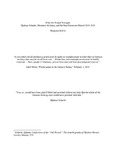What the Wizard Wrought: Hjalmar Schacht, Monetary Alchemy, and the Nazi Economic Marvel 1933-1938 (thesis)

View/
Author
Ruffel, Benjamin Zane
Subject
Washington and Lee University -- Honors in History
Schacht, Hjalmar Horace Greeley, 1877-1970
Statesmen
Germany
Biography
Economic policy
1933-1945
National socialism
Metadata
Show full item recordDescription
Thesis; [ACCESS TO FULL-TEXT IS RESTRICTED. REQUESTS WILL BE SUBMITTED TO THE AUTHOR.] Benjamin Zane Ruffel is a member of the Class of 2013 of Washington and Lee University. Mainstream historiography has largely missed the substance of the Nazi economic revival. Many historians accepted at face value the claim that the regime's program of public works (particularly the construction of the Autobahnen) provided the requisite employment stimulus. Richard Grunberger takes this tack in The 12-Year Reich. In 1933, he avers, the Nazis “embarked on a massive job-procurement program—public works projects, subsidized housing repairs and so on—which cut the peak unemployment figure of 6 million by over 40 percent within a year.” Most German textbooks deal with the recovery on similarly cursory basis. Holger Herwig's Hammer or Anvil: Modern Germany 1648-Present can be considered representative; it credits the Nazis' “two-pronged strategy” of “government-sponsored public works programs and an unprecedented rearmament program” with bringing the country out of the depression and devotes two brief paragraphs to the subject. The historiographical treatment of the recovery typically ends there. Proper comprehension of the Nazi economic miracle, such as it was, usually does not merit inclusion in most works on the Third Reich.
The author of the recovery has likewise been neglected. If Albert Speer was the architect of Nazi Germany's war economy, then his antebellum counterpart was surely Hjalmar Schacht. Schacht presided over the Reichsbank from 1933 until the beginning of 1939, and showed extraordinary inventiveness battling Germany's foreign exchange crises and funding the government's deficit spending during that period. He earned himself the sobriquet of the “wizard” for these feats, and there can be little doubt that Schacht's monetary policy served, at the very least, as the necessary precondition for Nazi Germany's rise as a military and economic behemoth. [From the Introduction]